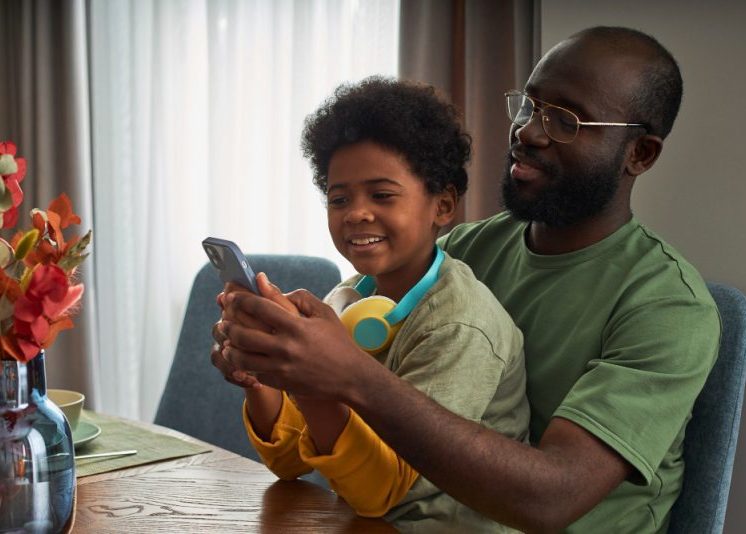The Mirror Effect: How Your Actions Become Your Child’s Reality

“Mama Tobi, biko, tell Aunty Ifeoma I’ve gone to the market,” Chinedu called out, phone pressed to his ear as he rummaged for his car keys. Little five-year-old Tobi, perched on the living room sofa, watched his father intently. Chinedu winked at him, then into the phone said in a serious tone, “Aunty Ifeoma, good afternoon. I just stepped out to the market now, will be back shortly.” He ended the call with a chuckle. Later that day, Tobi, playing with his toy phone, was “talking” to his imaginary friend. “Biko Funmi,” he lisped, mimicking his father’s tone, “tell Mummy I’ve gone to play with Dele.” He then giggled, looking around as if sharing a secret.
This small scene, likely familiar to many Nigerian households, perfectly illustrates a profound truth: our children are always watching, and more importantly, they are always learning. They are little mirrors, reflecting not just our spoken words, but our unspoken actions, our habits, and our underlying values. As parents, we are their primary role models, and the lessons they learn by observing us can have a lasting impact on who they become. Let’s delve into some common parental missteps and the subtle yet powerful ways they shape our children’s reality.
The Mirror of Honesty (or Dishonesty): What Our “Small” Lies Teach
How often have you told a “small white lie” on the phone to avoid someone, like Chinedu did? Perhaps you’ve exaggerated a story to make it more entertaining, or made a promise to your child that you didn’t fully intend to keep. While these might seem like harmless shortcuts in the moment, our children are absorbing these lessons. They learn that dishonesty is a viable tool for navigating social situations or getting what you want. They might start to bend the truth themselves, perhaps to avoid punishment or to gain an advantage amongst their peers. Over time, this can blur their understanding of right and wrong and erode the foundation of trust within your family. The antidote? Model honesty, even in seemingly insignificant situations. If you make a mistake or can’t keep a promise, explain it to your child truthfully and age-appropriately. Show them that integrity matters, even when it’s inconvenient.
The Mirror of Communication and Conflict: How We Handle Disagreements
Think about the last time you had a disagreement with your spouse, a sibling, or even a customer service representative. Did your voice rise? Did you resort to harsh words or dismissive language? Our children witness these interactions, and they learn that this is how adults handle conflict. They might start yelling when they don’t get their way, struggle to express their feelings constructively, or even become conflict-avoidant if they perceive disagreements as inherently negative and volatile. They learn that communication is about winning an argument, not about understanding each other. Instead, consciously model calm and respectful communication. Show them how to listen actively, express their needs assertively but kindly, and work towards solutions in a disagreement. Let them see you apologize and make amends when you’ve made a mistake.
The Mirror of Self-Care and Self-Worth: Loving Ourselves, Loving Our Children
In a society that often places immense pressure on appearance, it’s easy to fall into the trap of self-criticism. Perhaps you constantly comment on your weight, complain about your looks in the mirror, or neglect your own well-being in the whirlwind of daily life. Your children are listening, and they internalize these messages. They might develop negative body image issues, believing that their worth is tied to their physical appearance. They might also learn that it’s not important to prioritize their own needs, mirroring your self-neglect. Instead, practice positive self-talk. Embrace your body and show your children the importance of taking care of themselves – both physically and mentally. Let them see you engaging in activities that bring you joy and that you prioritize your well-being.
The Mirror of Technology and Distraction: Being Present in the Moment
In today’s digital age, it’s incredibly easy to be physically present but mentally absent, glued to our phones during family time, meals, or even while our children are trying to share something important. Our constant distraction sends a powerful message: what’s on the screen is more important than what’s happening right here, right now. Children can feel ignored, their need for connection unmet. They might also learn that it’s acceptable to be constantly distracted and disengaged in their own interactions. Make a conscious effort to be present when you’re with your children. Put your phone away during dedicated family time. Listen actively when they speak, making eye contact and showing genuine interest. Demonstrate that they are your priority.
Reflecting on Our Reflections: A Call to Mindful Parenting
Parenting is a journey of continuous learning and growth. We will inevitably make mistakes. However, by understanding the powerful “mirror effect” our actions have on our children, we can become more mindful of our everyday behaviors. Before you react, before you speak, take a moment to consider: “What lesson am I teaching right now?” Aim not for perfection, but for conscious effort. By striving to be the best versions of ourselves, we empower our children to reflect those positive qualities back into the world, shaping not just their reality, but generations to come.
Are there everyday actions you’ve become more mindful of as a parent? Share your experiences in the comments below!